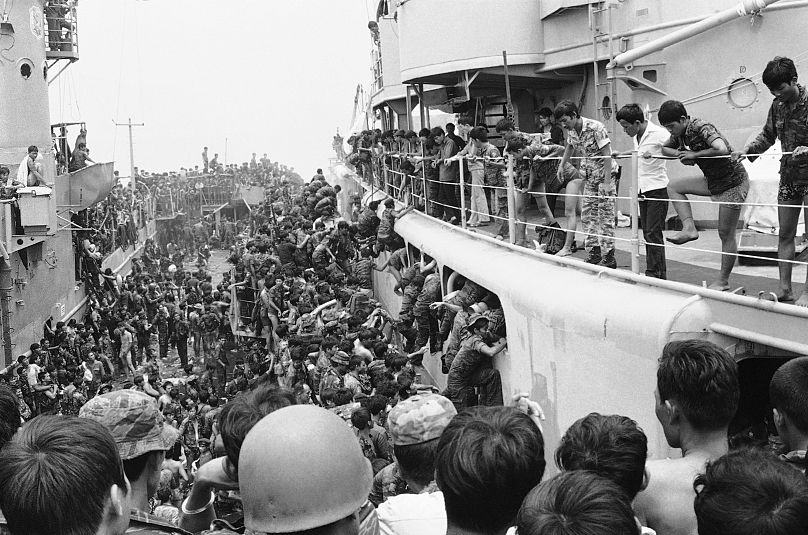More than 5,000 Vietnamese nationals have also left Ukraine for neighboring countries. In the Czech Republic, they have been welcomed.
“When the war broke out, we thought we had to do something,” remembers Nga Dao of Lam Cha Me, a Vietnamese community association in Prague, the Czech capital.
The Russian invasion of Ukraine on February 24 sparked spontaneous community activity across central Europe, to where almost four million million Ukrainian refugees have now fled.
For the Vietnamese community in the Czech Republic, who make up around one percent of the population, it was no different.
“We contacted a few other organizations to ask if we could help with some things,” Nga Dao explains. After collecting a truckload of clothes for children and women, donated by the Vietnamese community, they drove it to the collection point but were told it was not accepting any more donations.
So, instead, they opened their own distribution point. On Facebook, they asked local business owners if there was any free space; they were given access to an empty store next to a metro station. Fortunately, it is only one stop away on the subway from the refugee registration point, says Nga Dao.
When an appeal went out for donations, they were inundated: food; drink; baby strollers; school bags; diapers; and shower gels. “Not only do Vietnamese people regularly bring items to contribute, but also Czech passersby who see us there also come to help. I feel very grateful for this,” she adds.
As well as handing out essentials, the team at Lam Cha Me also provides free Czech-language classes for Vietnamese children who had arrived from Ukraine says Nga Dao. “The class has already started a few lessons, and hopefully they will soon catch up in school.”
More than 300,000 Ukrainians have now entered the Czech Republic, the country’s prime minister, Petr Fiala, told parliament on March 23. Additionally, more than 5,000 Vietnamese nationals have also left Ukraine for neighboring countries, with around 300 so far traveling to the Czech Republic, Thai Xuan Dung, the Vietnamese ambassador to Prague, told Euronews last week.
He estimated that 7,000 Vietnamese people were in Ukraine before the war broke out, with many having now returned to Vietnam thanks to flights put on by the Hanoi government.
According to Dung, his staff have collected more than €20,000 in donations from the Vietnamese community in the Czech Republic since the war began. Around half has been sent to the Vietnamese embassies in Poland and Romania, where most of the Vietnamese nationals have fled to from Ukraine, to help buy essential supplies.
The rest has been donated to local institutions, such as Prague’s Fire and Rescue Department, which is assisting Ukrainian refugees.
“This beautifully shows how well integrated the Vietnamese community in the Czech Republic is,” says Lucie Pštrosová, a spokesperson for the Czech-Vietnamese Educational Institute, a non-profit that has also provided assistance to Ukrainian refugees. “It's great to watch one minority help the other,” she adds.
According to a 2019 study, Ukrainians make up the largest share of the foreign-born population in the Czech Republic. After the Slovakians, the Vietnamese come third.
Estimates suggest that ethnic Vietnamese account for just shy of one percent of the country’s population. Nguyen, the most prevalent Vietnamese surname, is now the eighth most common in the Czech Republic. Pho, the traditional Vietnamese soup, has become adopted as a Czech favorite.
While many Vietnamese now living in western Europe, such as in France, fled the country in the 1970s to escape the communist takeover of South Vietnam, most in central and eastern Europe arrived in the 1980s thanks to the friendship deals between Hanoi and the communist Eastern bloc.
The Soviet Union — which Ukraine was part of until 1991 — was one of Vietnam’s few friends during the 1980s when it was seen as an international pariah. The richest man in Vietnam, Pham Nhat Vuong, the founder of the sprawling VinGroup conglomerate, started out in business selling dried noodles in Kyiv.
Community relations in the Czech Republic improved greatly during the COVID-19 pandemic. In the early months, Vietnamese community groups and associations were quick to respond, from donating to local charities to sewing the cloth face-masks that were commonly worn in the country.
In Ústí nad Labem region, in the northwest, the Vietnamese community raised more than €30,000 to buy artificial ventilators for three local hospitals.
The community groups in Prague who spoke to Euronews didn’t want to speak about geopolitics. Russia is the largest supplier of military arms to Vietnam, and close bilateral relations date back to the Soviet Union, when Moscow was one of the few friends of communist Vietnam after the 1970s. At two votes this month in the UN General Assembly to reprimand Russia for its invasion, Vietnam abstained.
“The Vietnamese government has been trying to be neutral on the issue,” says Le Hong Hiep, a senior fellow at the ISEAS-Yusof Ishak Institute, a think-tank in Singapore. Yet Vietnam’s ruling Communist Party has not taken such a strict
line internally. Vietnam’s state-run media has relative freedom to report on the war, Hiep noted, and public opinion is divided.
“While the majority of the people condemn Russia and Putin for the invasion of Ukraine, some people are sympathetic with them and blame NATO and the US for ignoring Russia’s security concerns,” he said. “Some even blame Zelenskyy and his government for being naïve and ignorant, which created this crisis for themselves.”
For Vietnamese nationals living in Europe, with far greater access to independent media and closer to the war, anecdotal evidence suggests there is far more opposition to Putin’s invasion. But geopolitics and questions of who-is-to-blame are secondary. For many, the response is about common humanity.
“I think the current actions to help and support refugees are happening everywhere, not just in the Vietnamese community in the Czech Republic,” says Nga Dao, of the Lam Cha Me group. “That is the action of the people in the civilized world.”












